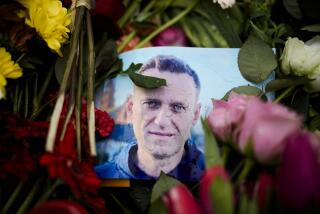Soviets Block Sister’s Trip to Give Marrow
- Share via
MOSCOW — Soviet officials have prevented a Moscow woman from traveling to Israel to donate bone marrow in a last-resort attempt to save the life of her cancer-stricken brother.
Despite the intervention of Dr. Robert P. Gale, the Los Angeles-based physician who supervised bone marrow transplants for victims of the Chernobyl nuclear plant disaster, Soviet authorities have denied a temporary exit visa to Inessa Flerova, a 37-year-old economist.
Her brother, 31-year-old Mikhail Shirman, is suffering from leukemia, and doctors say he could die in a matter of months unless there is a successful bone marrow transplant using his sister as a donor.
Shirman emigrated from the Soviet Union to Israel, which does not have diplomatic relations with Moscow, in 1980, and Flerova said her brother’s emigration has influenced the thinking of Soviet officials.
They suggested that she and her husband apply for permanent emigration to Israel on a non-emergency basis even though that would take at least four to five months.
“I said, ‘My brother can die within four or five months,’ ” Flerova recalled. “The inspector said that he (Shirman) had given up his Soviet citizenship and that’s why he had no right to issue a visitor’s invitation or come here.”
Shirman discovered two months after his August, 1985, marriage to a 21-year-old Israeli woman that he was suffering from leukemia.
He is receiving daily chemotherapy threatment at Kaplan Hospital in Rehovot under the supervision of Dr. Alain Berrebi, head of the hospital’s chemotherapy unit.
The most immediate danger is that Shirman will develop resistance to the chemotherapy, and if that happens, he could die as early as next fall, the doctor said.
Deteriorating Condition
Berrebi said Shirman’s conditions has deteriorated rapidly in recent months and now, even with a bone marrow transplant, his chances of survival are down to 30%.
“When dealing with young people, the prognosis is usually very bad,” he explained.
Shirman’s mother, Yevgenia, who emigrated to Israel to be with her son, was tested as a possible donor. It was found that her marrow did not match his, however.
Chances that his sister would be a suitable donor are only one in four--not good, but far better than the “one-in-a-million” odds that another donor with matching marrow could be found from a non-family member, Berrebi said.
Flerova, a senior economist at the Center for Urban Construction, said her brother first asked her last November to to come to Israel for a possible bone marrow transplant operation.
Sent Letter to Gorbachev
After receiving a formal invitation from Shirman’s Israeli doctors, she applied for a temporary exit visa last March 31. When she got no answer within a month, she wrote a letter to Soviet leader Mikhail S. Gorbachev, but that failed to produce results, too.
In May, she said, visa officials told her they would consider her application, but officials at her work place warned that they would refuse to provide her with a required good character report.
“When I told them I had relatives in Israel, it was like a bomb,” she said.
Flerova and her husband, Viktor, 38, finally applied for immigration visas on July 2, although they realized that it might be five months before they receive an answer, and neither of them had planned to leave the Soviet Union. They also enlisted the help of Gale.
“I talked to him three times by phone,” Viktor said. “Dr. Gale made a request to the Ministry of Health and was told there would be an answer. . . .
“We believed that after Dr. Gale’s request it would be impossible to answer him ‘no,’ but he simply was not answered.”
‘Short of Time’
“Now we are waiting, just waiting,” Flerova said. “And we are short of time. . . .
“The doctors said the best time for an operation was July. August would be worse and September, much worse. . . .”
Gale was out of the United States and not available for comment on the situation.
Yuri Stern, a spokesman for the Soviet Jewry Education and Information Center in Jerusalem and an old school friend of Inessa, termed the situation “disgusting.”
He said that at the request of Soviet authorities, he kept Shirman’s case under wraps for several months. Now he regrets what he did.
“They are playing with human lives and do not care,” he said. “We overestimated the Soviet machine.
Times research assistant Yael Hadaya, in Jerusalem, contributed to this article.
More to Read
Sign up for Essential California
The most important California stories and recommendations in your inbox every morning.
You may occasionally receive promotional content from the Los Angeles Times.













